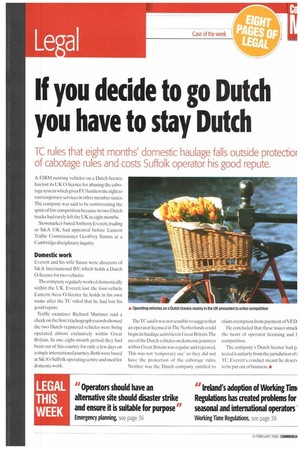If you decide to go Dutch you have to stay Dutch
Page 33

If you've noticed an error in this article please click here to report it so we can fix it.
TC rules that eight months' domestic haulage falls outside protectior of cabotage rules and costs Suffolk operator his good repute.
A FIRM running vehicles on a Dutch licence has lost its UK 0-licence for abusing the cabotage system which gives EU hauliers the right to run temporary services in other member states. The company was said to he contravening the spirit of fair competition because its two Dutch trucks had rarely left the UK in eight months.
Stowmarket-based Anthony Everett,trading as S&A UK, had appeared before Eastern Traffic Commissioner Geoffrey Simms at a Cambridge disciplinary inquiry.
Domestic work Everett and his wife Susan were directors of S&A International BV. which holds a Dutch 0-licence for two vehicles.
The company regularly worked domestically within the UK. Everett lost the four-vehicle Eastern Area 0-licence he holds in his own name after the TC ruled that he had lost his good repute.
Traffic examiner Richard Mutimer said a check on the firm's tachograph recordsshowed the two Dutch-registered vehicles were being operated almost exclusively within Great Britain. In one eight-month period they had been out of this country for only a few days on a single international journey. Both were based at S&A's Suffolk operating centre and used for domestic work.
TheTCsaid it was not sensible to suggest that an operator licensed in The Netherlands could begin its haulage activities in Great Britain.The use of the Dutch vehicles on domestic journeys within Great Britain was regular and repeated. This was not 'temporary use' so they did not have the protection of the cabotage rules. Neither was the Dutch company entitled to claim exemption from payment of VED
He concluded that these issues struck the heart of operator licensing and competition.
The company's Dutch licence had p] tected it unfairly from the jurisdiction of 1 TC. Everett's conduct meant he desen to he put out of business. •






































































































































































































